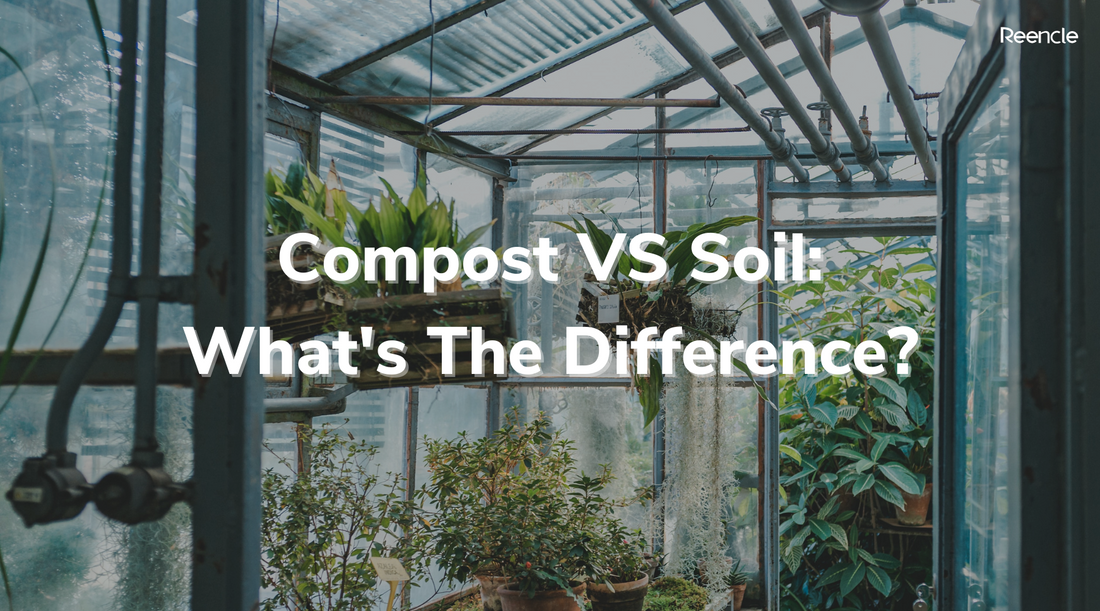Compost and soil share many similarities, but they are not one and the same. That being said, it is understandable that they’d be confused with one another, given how alike they are, especially in terms of appearance. While there are people who tend to use soil and compost interchangeably, they have separate, yet equally important roles.

What Is Soil?
Soil, commonly referred to as “earth” or “dirt” is a mixture of organic matter, minerals, gasses, liquids, as well as organisms that support life. Given that plants grow in soil, its role is an extremely important one. We see soil almost everywhere we turn, but did you know that it takes up to 1,000 years for soil formation to take place? Soil formation occurs through the interactions of air, water, rocks, chemicals, and decaying plant and animal life. This process is also assisted by plant roots and lichens wearing down rocks, creating new soil while roots and oxygen loosen and introduce air into it. Once soil has been used for multiple growing seasons*, it’s in need of amendments and more soil to be added in order to bring the nutrients back to a healthy level.
*Growing seasons are parts of the year where rainfall and temperatures allow plants to grow successfully.
What Is Compost?
Compost is a mix made up completely of food/kitchen waste and dead plants. Compost is created with decaying nutrient-rich soil with medium density. Depending on the composting method, compost can also be made with branches, cardboard shreds and other brown materials. The materials in a compost mix break down into extremely rich soil, which makes it the perfect mulch.
Knowing what soil and compost mean respectively, let’s talk about the added advantages of using compost with your soil.
Advantages of Compost
Since compost has high organic matter, it seamlessly increases the level of organic matter in soil leading to better soil composition stability, higher water holding capacity and infiltration rate.
Compost has an abundance of microbes and high microbial diversity. Given that microbes are a key component of the composting process, a wide number of bacteria, fungi, protozoa etc., can be found in compost, which boosts microbial activity in soil that is combined with compost. Composters like Reencle are ideal compared to heat/drying type composters in this context, as high temperatures can result in the loss of microbes.
Microbial activity also affects the availability of nutrients in compost. Some nutrients that are delivered with compost are plant available*, but incorporating them into soil allows the compost microbes to begin mobilizing nutrients from the soil, thus also making the soil nutrients plant available.
*plant available is the amount of soil nutrients in chemical forms accessible to plant roots/compound that are likely to be converted during growing season.
Besides providing plants with nutrients that are vital, microbes also play a critical role in suppressing soil-borne diseases. A lot of composts have the ability to suppress pathogen activity.
Chemical fertilizers are toxic and can harm humans and animals when continuously inhaled (or accidentally ingested). Touching chemical fertilizers can also cause skin irritation. Excessive and disproportionate use of chemical fertilizers can also lead to plants not having good plant characteristics like good root system, shoot system, nutritional characteristics and won’t have time to grow or mature properly.

It’s a common misconception that compost can be used in place of soil, but hopefully after reading this you’ll be able to see that both soil and compost are meant to complement each other, not replace the other.
Do you have any other questions about compost? Send us a message on our Instagram or Facebook! If you’d like us to discuss any interesting topics on Get Inspired, let us know here.

